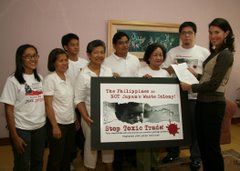Toxic Treaty Favors Japan, Not the Philippines
Senate Forum Bares Legal Traps and Empty Promises of the JPEPA
August 14, 2007. Manila, Philippines. “In my view, the JPEPA is an atrocious treaty,” exclaimed noted international legal law expert and former Dean of the UP College of Law, Dean Merlin Magallona, one of the invited speakers at a roundtable discussion at the Senate today, which provided the venue for impacted sectors to share their findings on the Japan-Philippines Economic Partnership Agreement (JPEPA).[i] Representatives and experts on behalf of nurses, agricultural workers, labor, and debt issues were present at the roundtable discussion. Foremost among the concerns raised by the group is how much favored Japan is under the JPEPA, at the expense of Filipinos and how the treaty ties the hands of the Philippine legislature in passing protective and development measures that favor and support Filipinos.
“It is high time that the sanitizing glare of the Senate and public scrutiny be placed upon this agreement,” said Atty. Tanya Lat, lead counsel for the Magkaisa Junk JPEPA Coalition. “Once the Senators have closely examined JPEPA they will see for themselves just how much of our future we have traded away for illusory short term gains.”
Dean Magallona and other experts at the forum pointed out that the JPEPA obligates the Philippines to automatically treat Japanese investors equal to Filipinos in practically all aspects of their investments in the Philippines, considerably more than what Japan has with other countries. “What is the value of a Filipino in his own economy?” wonders Dean Magallona, when the Philippine government through JPEPA has placed Japanese as our equals.
Alarm was also raised over the incomplete and sloppy reservations made by the Philippines for existing and future measures under Annex 7 of the agreement relating to investments. Reservations are crucial because it acts as a protective barrier for a country’s interest, and failure to include a reservation under Annex 7 of the JPEPA prevents a country from invoking that protection or law for the entire life of the treaty.
For existing measures, it was revealed at the forum that Japan’s reservations are extensive compared to the Philippines. In various investments areas Japan will deny Filipinos the right of equal treatment (national treatment); they will deny the Philippines favorable treatment they accord other countries (most-favoured nation); and Japan will impose performance requirements such as preferential use of Japanese labor to the detriment of Filipino labor.
For future protection under JPEPA, Japan invoked the right to adopt or maintain any measure relating to investment against the Philippines. The Philippines has none. The failure of the Philippine negotiators to reserve future measures severely limits Philippine legislative power under JPEPA, raising serious constitutional issues, particularly the usurpation by the executive branch of legislative powers violating the principle of independence of the three branches of government.
Dean Magallona also stressed that under the JPEPA any preferences given to Japan will have to be extended to other 150 members of the WTO. “JPEPA extends far beyond WTO commitments,” further warns Dean Magallona.
“We’ve given the Japanese everything, including the kitchen sink, under the JPEPA,” exclaimed Mr. Josua Mata, Secretary General of the Alliance for Progressive Labor. “Who’s next in line? The Chinese? The Americans? What will be left for us and for our country, and more importantly, will there be anything left for future Filipinos?”
The other speakers raised the following findings on JPEPA:
- Toxic Wastes: The exchange of diplomatic notes between Japan and the Philippines is an insufficient safeguard because Japan can easily re-classify its toxic wastes into recyclable wastes and claim that these wastes have economic value for the Philippines. Ratification of the Basel Ban Amendment by the Philippines and Japan is needed.
- Fisheries: The coverage area of JPEPA includes the Philippine’s Exclusive Economic Zones and continental shelf. This could possibly allow unhampered access of Japanese commercial fishing industry to at the expense of municipal and artisanal fishers. JPEPA will further exploit depleted Philippine marine resources.
- Philippine Nurses: JPEPA merely treats our workforce as commodities to be traded in exchange of remittances. Filipino nurses migrate to work abroad not out of choice but out of necessity. They would rather stay here but the government has yet to this day implemented the Nursing Act of 2002 and the Magna Carta for Public Health Workers; thus, many nurses still continue to receive below living wages and inadequate benefits.
- Domestic Labor: JPEPA would result in de-industrialization and endanger the country’s domestic agricultural and industrial products resulting in the dislocation of domestic labor associated with the industries that produces these goods. The free entry of lower-costing products from Japan will further result in the dependence of our agricultural and industrial sectors to imported goods
- Japan’s Official Development Assistance (ODA). JPEPA will not address the failures of the Japanese ODA. The fact that 99% of the ODAs are loans rather than outright grants, and the endemic issues of corruption and lack of transparency in the handling of foreign assistance funds will remain, in spite of JPEPA.
“If the Senate is to exhaustively hear this treaty out, it must do so with respect to all sectors affected,” stated Atty. Richard Gutierrez, Basel Action Network, Asia-Pacific. “The JPEPA is first in a line of bilateral trade and investments agreement which the executive is itching to sign. It’s better to start on the right foot - look at the facts not the propaganda, and ask the real question, “What are we really trading, anyway?”






No comments:
Post a Comment